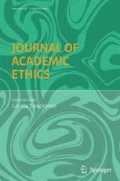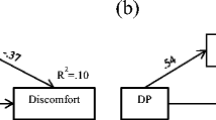Abstract
This study aimed to evaluate Jordanian pharmacy postgraduate students’ knowledge, behavior and perception about plagiarism and why do they commit such research misconduct.
This is a cross-sectional survey that was conducted in Jordan during the period between June-July 2019. The study targeted postgraduate pharmacy students from all Jordanian universities. Recruited students were asked to fill out the study questionnaire to evaluate their knowledge, behavior, and perception about plagiarism.
A total of 103 postgraduate students participated in this survey, most of them (n = 93, 90.3%) were enrolled in masters programs. Most of them (n = 72, 69.9%) reported that they have committed plagiarism during their studies, but this work was unintended for about 76.4% (n = 55) of the plagiarist.
Students were asked about 12 items that represented plagiarism actions and most of postgraduate students were able to identify most of the actions as plagiarism (> 60% for most items). Overall, the mean knowledge score for students about plagiarism was 8.6 ± 2.6 (out of 12).
Regarding students’ perceptions towards plagiarism, many students (n = 99, 96.1%) believed that plagiarizing is as bad as to steal from someone and 92.2% (n = 95) reported that plagiarism is considered against their ethical values.
This study found a high rate of plagiarism among postgraduate pharmacy students in Jordan despite their awareness and understanding of the concept and its different forms. Academic institutions must establish formal policies to raise awareness about plagiarism, enforce and implement penalties for those who commit plagiarism.



Similar content being viewed by others
References
Ajzen, I., Joyce, N., Sheikh, S., & Cote, N. G. (2011). Knowledge and the prediction of behavior: The role of information accuracy in the theory of planned behavior. Basic and applied social psychology, 33(2), 101–117.
Bilic-Zulle, L., Frkovic, V., Turk, T., Azman, J., & Petrovecki, M. (2005). Prevalence of plagiarism among medical students. Croat Med J, 46(1), 126–131.
Brimble, M., & Stevenson-Clarke, P. (2005). Perceptions of the prevalence and seriousness of academic dishonesty in Australian universities. The Australian Educational Researcher, 32(3), 19–44.
Denisova-Schmidt, E. (2018). Corruption, the Lack of Academic Integrity and Other Ethical Issues in Higher Education: What Can Be Done Within the Bologna Process? , European Higher Education Area: The Impact of Past and Future Policies (pp. 61–75). Springer.
Gullifer, J., & Tyson, G. A. (2010). Exploring university students’ perceptions of plagiarism: A focus group study. Studies in Higher Education, 35(4), 463–481.
Howard, S. J., Ehrich, J. F., & Walton, R. (2014). Measuring students' perceptions of plagiarism: Modification and Rasch validation of a plagiarism attitude scale.
Idiegbeyan-Ose, J., Nkiko, C., & Osinulu, I. (2016). Awareness and Perception of Plagiarism of Postgraduate Students in Selected Universities in Ogun State, Nigeria. Library Philosophy and Practice.
Ismail, K. H. (2018). Perceptions of Plagiarism Among Medical and Nursing Students in Erbil. Iraq. Sultan Qaboos University medical journal, 18(2), e196–e201. https://doi.org/10.18295/squmj.2018.18.02.012
Jereb, E., Perc, M., Lämmlein, B., Jerebic, J., Urh, M., Podbregar, I., et al. (2018). Factors influencing plagiarism in higher education: A comparison of German and Slovene students. PLoS one, 13(8), e0202252.
Joob, B., & Wiwanitkit, V. (2018). Plagiarism: Either intentional or unintentional, it is still plagiarism! Perspectives in clinical research, 9(3), 151–151.
Jordan, A. E. (2001). College student cheating: The role of motivation, perceived norms, attitudes, and knowledge of institutional policy. Ethics & Behavior, 11(3), 233–247.
Kokkinaki, A. I., Demoliou, C., & Iakovidou, M. (2015). Students’ perceptions of plagiarism and relevant policies in Cyprus (journal article). International Journal for Educational Integrity, 11(1), 3. https://doi.org/10.1007/s40979-015-0001-7
Leask, B. (2006). Plagiarism, cultural diversity and metaphor—implications for academic staff development. Assessment & Evaluation in Higher Education, 31(2), 183–199.
Murtaza, G., Zafar, S., Bashir, I., & Hussain, I. (2013). Evaluation of student’s perception and behavior towards plagiarism in Pakistani universities. Acta Bioethica, 19(1), 125–130.
Park, C. (2003). In other (people’s) words: Plagiarism by university students–literature and lessons. Assessment & evaluation in higher education, 28(5), 471–488.
Perkins, M., Gezgin, U. B., & Roe, J. (2018). Understanding the relationship between language ability and plagiarism in non-native English speaking business students. Journal of Academic Ethics, 16(4), 317–328.
Ramzan, M., Munir, M. A., Siddique, N., & Asif, M. (2012). Awareness about plagiarism amongst university students in Pakistan. Higher education, 64(1), 73–84.
Resnik, D. B. (2005). The ethics of science: An introduction. Routledge.
Resnik, D. B., Neal, T., Raymond, A., & Kissling, G. E. (2015). Research misconduct definitions adopted by U.S. research institutions. Accountability in research, 22(1), 14–21. https://doi.org/10.1080/08989621.2014.891943
Roig, M. (2006). 'Avoiding plagiarism, self-plagiarism, and other questionable writing practices: A guide to ethical writing'.
Ryan, G., Bonanno, H., Krass, I., Scouller, K., & Smith, L. (2009). Undergraduate and postgraduate pharmacy students’ perceptions of plagiarism and academic honesty. American journal of pharmaceutical education, 73(6), 105.
Scanlon, P. M., & Neumann, D. R. (2002). Internet plagiarism among college students. Journal of College Student Development, 43(3), 374–385.
Selemani, A., Chawinga, W. D., & Dube, G. (2018). Why do postgraduate students commit plagiarism? An empirical study. International Journal for Educational Integrity, 14(1), 7.
Sinha, R., Singh, G., & Kumar, C. (2009). Plagiarism and unethical practices in literature. Indian journal of ophthalmology, 57(6), 481.
UoJ (2012). Regulations of granting a PhD degree in The University of Jordan. https://graduatedstudies.ju.edu.jo/Regulations%20and%20instructions/PhD.pdf.
UoJ (2017). Code of ethical conduct for students. The University of Jordan. https://www.ju.edu.jo/Documents/%D9%85%D8%AF%D9%88%D9%86%D8%A9%20%D8%B3%D9%84%D9%88%D9%83%20%D8%A7%D9%84%D8%B7%D9%84%D8%A8%D8%A9%20.pdf.
World Medical, A. (2013). World medical association declaration of helsinki: Ethical principles for medical research involving human subjects. JAMA, 310(20), 2191–2194. https://doi.org/10.1001/jama.2013.281053
Author information
Authors and Affiliations
Corresponding author
Ethics declarations
Conflict of interest
The authors declare that they have no competing interests.
Additional information
Publisher’s Note
Springer Nature remains neutral with regard to jurisdictional claims in published maps and institutional affiliations.
Rights and permissions
About this article
Cite this article
Abu Farha, R., Mukattash, T. & Al-Delaimy, W. Predictors of Plagiarism Research Misconduct: A Study of Postgraduate Pharmacy Students in Jordan. J Acad Ethics 19, 541–553 (2021). https://doi.org/10.1007/s10805-020-09386-x
Accepted:
Published:
Issue Date:
DOI: https://doi.org/10.1007/s10805-020-09386-x




